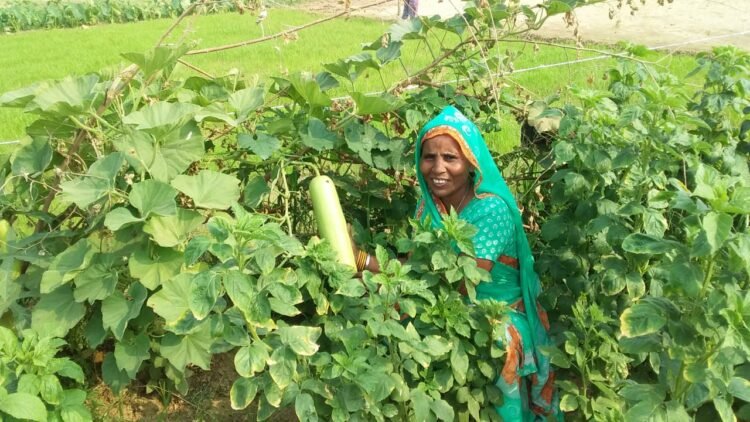AROH Foundation, a national level NGO, in 2016, while doing a baseline survey for upcoming holistic rural development project in villages found that the diet of Rangpur’s villagers consisted mostly of rice and potatoes, and so the then anemic population number was alarming. To enrich villagers’ diet and make it more nutritious in a cost-effective manner, reviving traditional kitchen gardens appeared to be the best option. Everyday diet in households of Rangpur and nearby villages included rice gruel and a vegetable-based curry or chutney. Pulses or animal foods were consumed just once a week. But villagers were unable to follow even this minimal diet throughout the year. It was a common practice to reduce the number of meals in a day when there was a scarcity.
Although AROH had been helping families to access nutritional supplements under various government schemes like Integrated Child Development Services (ICDS) scheme, through their Holistic Rural Development Program in the village, a key intervention was introduced of distributing seeds through SHGs and helping create kitchen gardens or backyard farming on small land near hand-pumps or where families were disposing of waste water. These kitchen gardens were meant to increase food diversity in the diets of the participating families and reduce reliance on the market for nutrients like fruits and vegetables. This backyard farming land was a small but significant way for families to produce enough nutritious food to combat malnutrition themselves. Kitchen gardens also contributes significantly to livelihood and water conservation as they make good use of waste water generated in various household activities and are boon for poorest households who can benefit the most from very little land.
MsLeelavati Devi lived with a family of five in Rangpur village of Bulandshahr district of Uttar Pradesh. Since her husband SantoshGiri was a farmer, her family relied mostly on farming for their diets and livelihood needs. mentioned that farming had become a non-remunerative enterprise in general. Villages in western UP were major sufferers of western disturbances, soil health deterioration, lack of soil nutrients, poor water management and non-availability of experts to guide. Farmers were toiling hard on the fields; still the outputs were not even enough to cope up the expenses they have invested in. Leelavati Devi narrated her turmoil that how dry rationcould be still arranged from farming and family expenses could be met through daily wage works but worst impacted was their families’ health because of unmet diet demand and low quality edibles. Leelavatifurthersaid that relying on the market for food could be costly; especially after the covid lockdown, when the food prices have shot so much.
An official from AROH Foundation, Mr.Mukesh Kumar recalls “Initially, there was resistance and a lack of understanding as people thought malnutrition was not a problem in their families. We had to inhibit in them that although people were not starving still many of them were ending up malnourished. The vegetables and fruits, they were usually eating like potatoes and bananas have little nutritious benefits and will not provide a growing child with the vitamins, minerals and proteins their body needs. It took some time, but they understood the silent threat of being undernourished”
According to Leelavati Devi, the kitchen garden had been impactful for her family and in her village. Her initial batch of seeds has since grown into a beautiful, diverse, garden. This garden includes turmeric, garlic, torai, chilli peppers, peas, eggplant, green leafy vegetable and tomatoes. proudly claimed that the foods grown in the garden were being utilized in recipes within their home. Leelavati Devi was a woman who had been actively engaged with self-help group created in the village by AROH Foundation, an NGO working in her village for past many years. She has also been trained in financial inclusion and digital literacy training by AROH. Additionally, she said the quantity was more than sufficient for the foods to be distributed equally for the whole family. The intervention has also been successful in reducing reliance on the market. PerLeelavati , some of the few foods which her family still relies on the market for are spices, black pepper, and oil.
Leelavati’s kitchen garden is placed next to the area where the family washes dishes. In addition to the waste water there is also a borewell which helps maintain the kitchen garden. noted that electricity can be unreliable in her village. Since the garden can be maintained with waste-water, it doesn’t require intense irrigation and they can maintain their garden and their diets regardless of the limited electricity.
There are around 3000 Households from Bulandshahr, Badaun and Firozabad districts of UP, who have got training and support for Backyard farming and there is noticeable improvement in their nutrition level and their income has also increased up to 2000-2500 per month.
A second batch of seeds for seasonal additions to the kitchen garden will be disbursed in the SHG meetings in the coming months. This new batch consists of Torai and carrots. The story of resilience and self-reliance has been a savior during the lockdown, when they are encouraged to exchange seeds with other households to increase food diversity within the whole village. Seed exchange and proper maintenance of the kitchen garden will allow this intervention to be sustainable for the foreseeable future.







